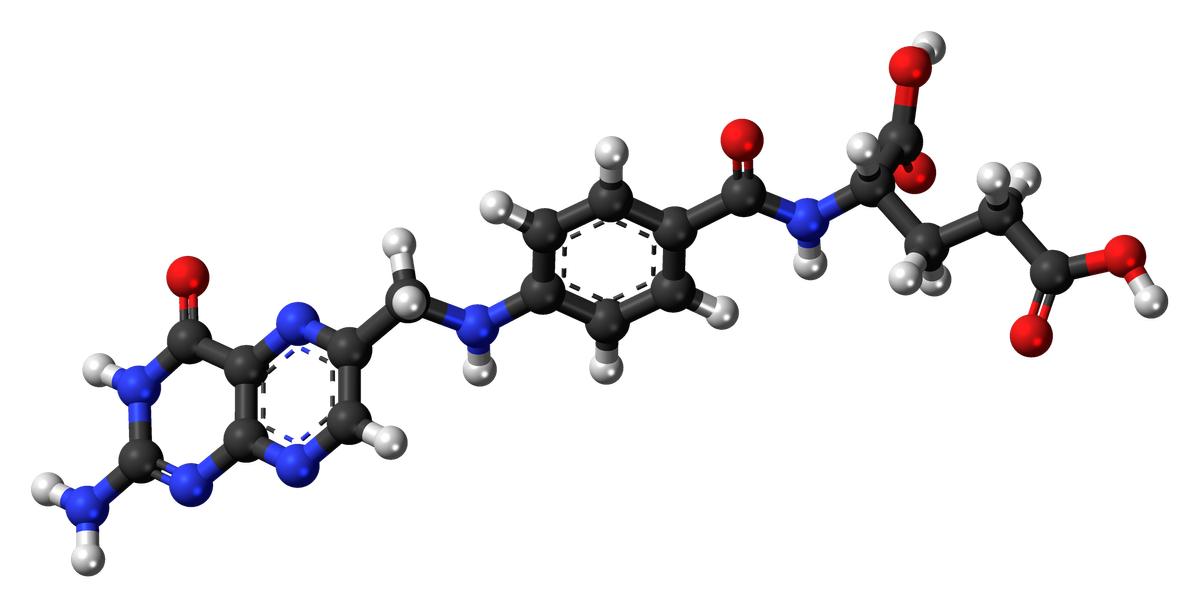L-5-MTHF

One in three Americans has a genetic variation that impairs their ability to properly utilize folic acid (also known as vitamin B9). The recent availability of the metabolically active form of folic acid (more appropriately, "folate") in supplemental form has the potential to improve health and prevent premature death for millions.
Folic acid's importance to human health has to do in part with its role in a biochemical process called methylation. Methylation refers to the transfer of methyl groups (one carbon bound to three hydrogen atoms). Methylation occurs billions of times in the body each day. The important thing here is that methylation is essential for health.
Folic acid is the synthetic form, which is used to fortify foods and used in vitamin supplements. L-5-methyltetrahydrofolate (L-5-MTHF) is the metabolically active form of folic acid, which is found in nature (certain whole, unfortified foods) . The "folic acid" found in food has to be cleaved (digested) from protein carriers in order to be absorbed. This process is inefficient in some individuals. Once absorbed, folic acid has to undergo several biochemical conversions in the body to become L-5-MTHF. Roughly one in two Americans have genetically inefficient enzymes that help create L-5-MTHF.
By supplementing with L-5-MTHF, one can be assured of getting the benefits of folic acid, regardless of their ability to absorb or convert it to the active form. If you are an individual with impaired ability to utilize regular folic acid, L-5-MTHF supplementation can make a truly dramatic difference in your health.
L-5-MTHF plays a role in DNA synthesis and repair. Inadequate levels of L-5-MTHF is linked to childhood leukemia. Cancers of the colon and breast are also associated with suboptimal L-5-MTHF status, as is the precancerous condition called cervical dysplasia. In a study involving smokers, high doses of folic acid and vitamin B12 reversed precancerous cellular changes in the lungs.
L-5-MTHF is very important to genetic expression. Methyl groups are strategically placed on certain genes to inactivate them. Every cell in the human body has the genetic information to produce every other type of cell. The thing is that most of the genes are not active. Methyl groups (supplied indirectly by L-5-MTHF) silence the genes that should not be active in a given cell at a given time. This is obviously critical for good health. Some of the genes within our cells are tumor promoters. Proper methylation, which requires L-5-MTHF, keeps these genes silenced. When L-5-MTHF is lacking, these tumor promoter genes become active and trouble begins. Cancer cells have been found to be lacking in methylation.
The importance of L-5-MTHF involves more than its role in promoting proper genetic expression, DNA synthesis and repair. L-5-MTHF also plays a role in dopamine, epinephrine, norepinephrine, histamine, L-DOPA, serotonin, and estrogen metabolism. Not surprisingly, folic acid deficiency is a consistent finding in depression. L-5-MTHF plays a role in forming S-adenosylmethionine (SAM or SAMe), which is the compound that directly donates methyls to DNA and to serotonin and dopamine. Like L-5-MTHF, SAM is available in supplemental form. SAM is a popular remedy for depression and arthritis. It is likely that individuals who respond to SAM are actually in need of L-5-MTHF. It makes sense to try L-5-MTHF before SAM because it is much less expensive.
L-5-MTHF also plays an important role in detoxification of a variety of compounds, including environmental toxins (such as mercury, lead, arsenic and tin), medications, and some of the body's own hormones. Estrogens are detoxified through methylation. Inadequate levels of L-5-MTHF cause potentially toxic build-up of estrogens in the body, which increases risk to breast, prostate and other cancers. Other conditions of estrogen excess, such as uterine fibroids and endometriosis, are also more likely to occur and be more severe. Histamine, epinephrine (adrenaline), and norepinephrine are also detoxified by methylation. Inadequate L-5-MTHF could therefore potentially worsen allergy and stress-related symptoms.
L-5-MTHF is critical for the detoxification of homocysteine, a metabolite of SAM. Like blood cholesterol, serum levels of homocysteine are directly associated with cardiovascular disease. In a recent study of people who had their atherosclerotic (clogged) coronary arteries treated by balloon angioplasty, homocysteine levels were measured. Half of the study participants were supplemented with folic acid and vitamins B6 and B12. At the end of the study, homocysteine levels and coronary artery clogging were again evaluated. The group that received folic acid, B6 and B12 had lower homocysteine levels and less blood vessel clogging. High homocysteine levels do more than damage arteries. Conditions associated with elevated homocysteine levels include coronary artery disease, heart attack, stroke, deep vein thrombosis, peripheral vascular disease, miscarriage, birth defects, depression, sensorineural hearing loss, osteoporosis, cancer, arthritis, dementia, Alzheimer's disease, Parkinson's disease, and complications of diabetes. It is unfortunate that more people don't know what their homocysteine levels are.
There is a new test that can identify individuals with impaired genetic ability to synthesize their own L-5-MTHF. This is called the MTHFR genetic mutation and currently any major medical laboratory can test it. Vibrant America Laboratory does this test for $50.
However, there is no harm in taking small doses of L-5-MTHF and its cost is reasonable: about $20 for a two-month supply. Not only will genetically-affected individuals fail to benefit from plain folic acid but a build-up of unmetabolized folic acid has adverse health effects. One of these is suppression of natural killer cell activity - immune cells that are very active in protecting against cancer and viral infections.
It is possible to overdose on L-5-MTHF. When there is excessive methylation, unpleasant symptoms such as anxiety may result. Starting with small doses is prudent. Some people may benefit from 10,000 micrograms or more but it is best to start with 200-1000 micrograms. A very important strategy is to supplement with additional nutrients that facilitate healthy metabolism of folate and methylation. Methyl Care is a product designed to accomplish this.
There are a number of foods that can help to support the methylation process in a gentle way. These include Raw leafy greens, beets, legumes, onions, soy, tomatoes, cruciferous vegetables, (arugula, broccoli, bok choy, Brussels sprouts, cabbage, cauliflower, horseradish, kale, kohlrabi, radish, rutabaga, wasabi and watercress), shitake mushrooms, seeds, eggs, liver, coco, curcumin, citrus juice, green tea, rosemary, blackberries, blackcurrants, blueberries, raspberries, and strawberries.
Exercise, stress, hormonal imbalances, toxicity, certain medications, and intestinal flora can all influence methylation. it is a consideration to start with diet and lifestyle changes and see if that is adequate in providing balanced methylation. If not, supplements should be used.
Source: Dr. Joseph Debé





